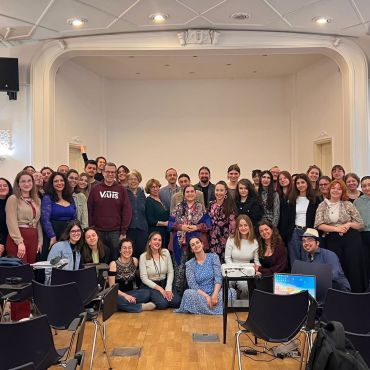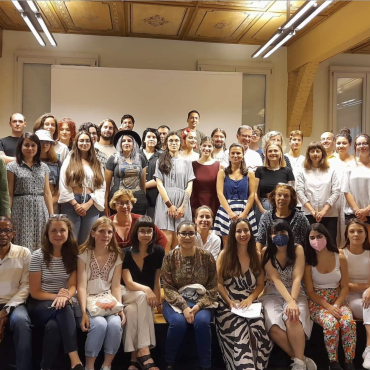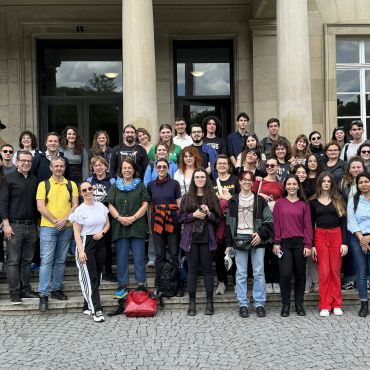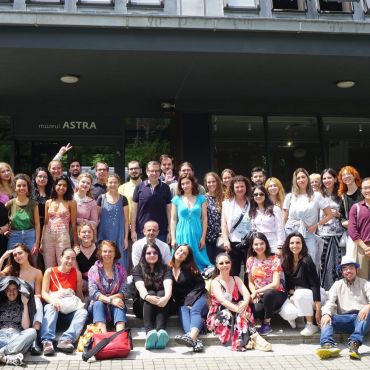Social sciences and Humanities going public - Research and practice with, in and for the society
Explore urban life and culture in museums, public spaces and institutions and learn about diversity and heritage in Athens, Greece.
← Back to courses- CIVIS focus area
- Society, culture, heritage
- Open to
-
- Bachelor's
- Master's
- Phd
- Field of studies
-
- Social Science and humanities
- Tipo
-
- Blended Intensive Programmes (BIP)
- Course dates
- 20 February - 24 April 2026
This blended mobility CIVIS course will introduce participating students to the field of Public Social Sciences and Humanities, with an emphasis on Anthropology, Ethnography, Literary and Folklore Studies and Education (AELFE).
The ‘Public’ here means a shift in the dissemination of the knowledge that these disciplines produce, especially concerning issues of wider public interest, such as:
- inequalities and inequities regarding access to resources,
- participation and recognition,
- belonging and homemaking,
- discrimination and racism.
How do people and communities respond to these issues? How do they create belonging and acceptance or build communities around these issues? How do public state and non state institutions and organisations support community building? What can critical Human/ Social sciences contribute to enable processes of community-building? These are some of the questions we will address in this program.
The ‘Public’ also means to not just work with and speak about communities, but to actively engage with stakeholders and members of the civil society and work jointly on solutions. These are e.g. museums, NGOs, local communities or neighbourhood associations.
AELFE, with their theoretical foundations and methodological apparatuses, are ideally placed to explore these social and communal issues as mentioned above. Yet, the challenge that these disciplines face today is to turn this potential into reality, return their knowledge to people and communities and engage with them once more, as scholars and partners.
Throughout this course, we will discuss how the concepts and methods of these different disciplines can contribute to this endeavour. Students will work in small groups on projects with an applied character. They will gain hands-on experience and learn how to work in an inter- and transdisciplinary fashion in order to achieve a better understanding of the contemporary societies we live in and the changes they undergo.
The members of our dynamic team of academics have had a long-term and productive collaboration relating to this BIP, which has been running for the past four years. We are combining our efforts to teach jointly the three streams into which our programme will be divided, so that our students may have the benefit of truly interdisciplinary perspectives, aligned with CIVIS’ strategic goals, such as inclusiveness, collaboration, a well-balanced geographical distribution of students and staff, and co-creation of knowledge and skills, proven by the extensive interaction with stake holders that we are planning to have.
Main topics addressed
We have identified three broader common fields, which are strongly interlinked, but for practical purposes we use them as separate themes (and streams) to organise the teaching around them:
- Museum and Material Culture and the formation of identities. This includes institutional collections and heritage sites as well as institutions such as state organized culture knowledge banks, and non-professional heritage institutions such as the internet. Important museums and archives expressing and promoting heritage aspects and practices in contemporary Athens will be visited during the course. Students will engage with the material collections and work together with the communities relating to these objects to understand the importance objects play for communities.
- Folklore, Orality and local culture - focus on the formation of identities. Comparative folklore, local/public folklore, urban folklore/urban culture, folklore and/in education. Students will explore public spaces, such as streets and buildings, collect narratives and/or folkloristic expressions and research the meaning and practice of them for the creation of collective memories as well as for identity production.
- Migration and Diversity – focus on identities, social inclusion and education. In this stream students engage e.g. with migrant, diasporic and refugee communities and individuals and research what migration means on the everyday level and how migration/movement impacts on groups' or individuals' belonging or non-belonging. Students learn e.g. how state institutions and N.G.O.’s establish programs and tools and foster and support inclusion and education and how those targeted respond to them.
Learning outcomes
Upon completion of the course, the students will:
- gain an understanding of what publically oriented social sciences and humanities may mean;
- learn about the prominent research and dissemination methods employed in the orientation of these disciplines towards a wider audience and develop a critical and constructive perspective on their uses;
- explore and understand the ways and strategies through which local, regional, national and transnational identities are forged in the public sphere by means of joint academic and grassroots, i.e. community- and stakeholder-derived, exchanges in contemporary Europe;
- expand and deepen the students’ knowledge regarding issues and challenges in the fields of material culture, local culture, narratives/oral tradition, folklore and migration, as they have developed in the social sciences and the humanities with an emphasis on contemporary Europe;
- appreciate the value of the comparative perspective when applied to the study of material culture, local culture, narratives/ oral tradition, folklore and migration in contemporary Europe;
- receive training in these methods;
- acquire an understanding of the interdisciplinary theoretical background of the methodologies used when addressing issues associated with the ‘Public’;
- be able to use this knowledge to complete the tasks assigned to the students and solve problems that require critical thinking;
- exchange knowledge across disciplines and universities.
Additionally, some of the CIVIS and EU priorities that our BIP intends to work on with students and social partners include social equity, inclusiveness, a collaborative orientation, co-creation of knowledge and skills jointly with stakeholders, and emphasis on a well-balanced geographical distribution of our human (students, teachers, public speakers) and academic resources (interdisciplinary methodologies, theories, environments and ethnographic examples).
| Dates: 20 February - 24 April 2026 | Total workload: 88 hours |
| Format: Blended | ECTS: 3* |
| Location: Athens, Greece | Language: English (B2) |
| Contact: vchrys@phil.uoa.gr |
*recognition of ECTS depends on your home university
Physical mobility
The physical mobility part will take place between 20-24 April 2026 and will be held in Athens, Greece. It will consist of lectures, workshops and visits to various places of interest, in which students will practice field research techniques, such as participant observation and interviews. There will also be times for study and co-creation of their projects, which they will present at the conclusion of the programme.
All students will visit the Acropolis and the Athens University History Museum in the historical area of Plaka, Athens, to be given the opportunity to reflect on different types of heritage.
Students will visit public institutions, museums, organisations and NGOs as well as local urban areas and enterprises, according to their streams:
- Stream One students will visit museums, such as the Museum of Modern Greek Culture and the Museum of Folk Art and Tradition "Aggeliki Chatzimichali" and will employ ethnographic walking in various districts of Athens, observing the interior and exterior of houses, galleries and cultural centres.
- Stream Two students will also practice ethnographic walking through the central markets and visit various shops with local and ethnic products, where they will conduct fieldwork and interviews.
- Stream Three students will visit the Hellenic Ministry of Culture and NGOs' learning centres, where they will interact with migrants and refugees and with their teachers. They will participate in a workshop employing the world cafe methodology, entitled "Exploring Refugee and Migrant Subjectivity (Life Worlds) through Narratives", to become acquainted with the impact of education on the formation of heritage and social identities.
The students of each stream will work in smaller groups (around 3-5 students) on designated projects, which involve training fieldwork exercises, e.g. in the form of interviews and participant observation. The information gathered during this practice will be critically reflected, assessed and analysed in class and developed into group project presentations, taking place at the end of the week.
Collaboration among students and self-directed learning is employed in both our virtual and physical phases of the BIP. The hands-on element is present in their visits to museums and ethnographic experience and they are connected with real-world challenges during their visits and participation in the learning activities of the NGOs catering for migrants and refugees.
Virtual part
The virtual part of the course will consist of 5 consecutive online sessions, held between 20 February - 3 April 2026, during which the main theoretical approaches of each stream will be dealt with. Teaching dates and hours are to be further decided on the basis of the number of students enrolled and their preferences for the streams. Possible problems on specific dates due to the university schedules of participant students will be dealt with accordingly.
In the virtual component, we start with a kick-off meeting, in which teachers and students are introduced to each other and the entire BIP (aims, streams, objectives etc.) is presented to the students through a power point. This is followed by another 4 online sessions for each stream conducted by members of the teaching staff who deliver lectures introducing the topics, basic concepts, theories and methodologies employed by each stream, i.e. material culture and museums, local cultures, urban folklore and orality, and migration and diversity.
They also discuss the projects the students will have to deliver at the end of the physical phase of the course and provide bibliographical resources for their study. The students make acquaintances with their instructors and with each other. They may work in small mixed teams, read and discuss texts and develop their knowledge about the topics they study. They may also start preparing the practical component of their chosen stream.
The hosting University (NKUA) provides free access to the Webex platform for teaching. A Google classroom will be created to allow instructors to upload any information and academic material necessary for our teaching. The flipped classroom design of the virtual classes will allow the uploading of prerequisite texts to the GC page of each stream, together with a set of questions indicating the most relevant parts of the textual inputs.
We will collect students' answers to these questions via Google Forms (GF) so as to enable the teacher to get an in depths understanding of the level of comprehension students acquired during the individual reading tasks. Based on the answers received, we will be able to plan the teaching activity for the virtual classes and, additionally, to spot the level of understanding the references and, more importantly, the white spots in comprehension as derived from individual reading.
After class, students will be encouraged to revisit the texts in the light of the debates organized during the virtual session. In preparation for the physical activity, which will consist of mainly field work related to each stream’s theme, a short quiz will be developed, also using GF to check the post-class class understanding of the theoretical framework. This way we will be able to foster peer learning as a core feature of the physical phase, which constitutes student-centered learning by partaking in real field research activities.
Assessment
The students' assessment will be based on their final presentation (written and oral). The criteria by which students' presentations will be evaluated are the following:
- coherence, understandability and stringency of the presentation - 50%
- consideration of societal issues and civic engagement - 25%
- theoretical contextualization of the empirical material - 25%
The programme is open to students at CIVIS member universities from all academic levels (Bachelor, Master, PhD), with background and a specific interest in the fields of Social Sciences and Humanities and, more specifically, in Anthropology, Ethnology, Folklore Studies, Urban Studies, Cultural Studies, Sociology, Psychology, Philosophy, Language and Literature, Archaeology, History, Education.
In order to follow the course, it is desirable for participants to:
- have a basic knowledge/ wish to acquire experience on how to work with and speak about communities, to actively engage with them, to identify problems and work jointly on solutions relating to them;
- know/ wish to learn research techniques and research methodologies in connection with each of the 3 streams;
- engage with and research on communities beyond the language barrier.
Skills such as critical thinking, fieldwork practice, interviewing, digital research in humanities and social sciences, interactive museum experience, project writing, collaborative work with peers, public folklore, public anthropology, qualitative methodologies in the humanities and the social sciences are to be developed along the programme.
NB: Visiting Students - Erasmus Funding Eligibility
To be eligible for your selected CIVIS programme, you must be a fully enrolled student at your CIVIS home university at the time you will be undertaking the programme. Applications for this course are only available for the 11 CIVIS member universities in Europe.
Partner universities:
- Eberhard Karls Universität Tübingen (Germany)
- National and Kapodistrian University of Athens (Greece)
- University of Bucharest (Romania)
Professors:
- Vassiliki Chryssanthopoulou, National & Kapodistrian University of Athens, Associate Professor of Folklore Studies, is a social anthropologist-cum-folklorist specialized in the study of migration, ethnicity, diasporas and transnationalism.
- Antigoni-Alba Papakonstantinou, National & Kapodistrian University of Athens, is Associate Professor of Sociology of Education at the Department of Education Studies.
- Georgios Kouzas, National & Kapodistrian University of Athens, Assistant Professor of Urban Folklore. He is a folklorist with a wide experience in the areas of oral folklore and literature, but also material culture and identity, especially among marginalized groups, such as beggars in Athens.
- Marlen Mouliou, National & Kapodistrian University of Athens, Assistant Professor of Museology at the Dept. of History and Archaeology of NKUA and a member of the Special Cross-faculty Committee of the MA in Museum Studies, is Coordinator of CIVIS Open Labs in the NKUA.
- Gabriele Alex, Univeristy of Tübingen, Professor of Social and Cultural Anthropology, gained her PhD from Brunel University and joined Tübingen University in 2010.
- Adrian Stoicescu, University of Bucharest, Associate Professor of Ethnology and Folklore Studies. He got his PhD with a thesis on gender studies in oral epics from the University of Bucharest in 2011 and was a fellow of the Romanian Academy in the field of digital ethnography.
- Gabriel Tamas, University of Bucharest, Assistant Professor of Ethnology and Folklore Studies. His main areas of interest are urban culture, contemporary folklore and mythology.
- Adelina Dogaru Alexa, University of Bucharest, is a Lecturer in the Department of Cultural Studies. Her research focuses on the anthropology of the senses, oral narratives, semiotics, and the arts.
Send your application by filling in the online application form by 30 October 2025, including:
- CV
- Motivation letter
- Level of English
Students will be evaluated based on:
- motivation - the reason behind the application for the BIP;
- display of an inquisitive mind;
- display of interest in other cultures and in the "other";
- level of accomplishment in the English language;
GDPR Consent
The CIVIS alliance and its member universities will treat the information you provide with respect. Please refer to our privacy policy for more information on our privacy practices. By applying to this course, you agree that we may process your information in accordance with these terms.




